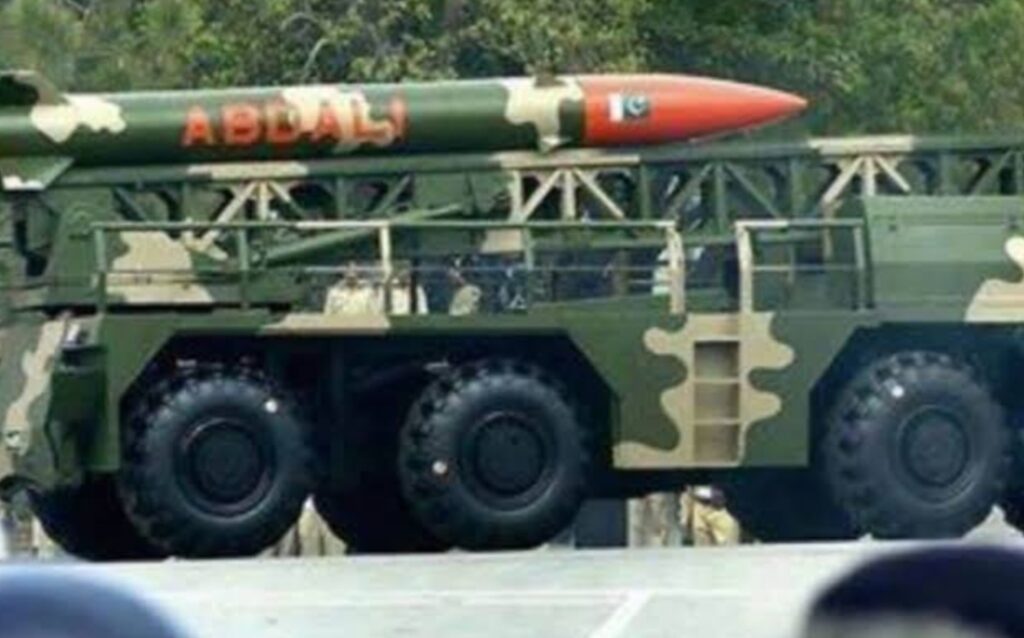Pakistan’s Abdali Missile Test: A Provocative Move Amid Strained India-Pakistan Relations
Samba Times Special

On May 3, 2025, Pakistan conducted a successful training launch of its Abdali Weapon System, a surface-to-surface ballistic missile with a reported range of 450 kilometers, as part of its military exercise dubbed “Exercise INDUS.” The Pakistan Army stated that the launch aimed to ensure the “operational readiness of troops and validate key technical parameters,” including the missile’s advanced navigation system and enhanced maneuverability features. However, the timing and context of this test have sparked strong reactions in New Delhi, with Indian officials labeling it a “blatant act of provocation.” Samba Times let know its readers that why Pakistan’s missile test has been perceived as provocative by India, delving into the geopolitical context, historical tensions, and strategic implications.
The Context: Escalating Tensions Post-Pahalgam Attack
The Abdali missile test comes on the heels of a deadly terror attack in Pahalgam, Jammu and Kashmir, on April 22, 2025, which claimed the lives of 26 civilians. India has attributed cross-border links to the attack, pointing fingers at Pakistan for its alleged support of terrorist networks. The attack has significantly heightened tensions between the two nuclear-armed neighbors, with India imposing punitive measures such as banning imports, postal services, and Pakistani-flagged ships from its ports.
In this volatile environment, Pakistan’s decision to test a ballistic missile capable of carrying both conventional and nuclear warheads has been seen as a deliberate escalation. Indian officials, speaking anonymously, have described the test as a “reckless act of provocation” and a “dangerous escalation” of Islamabad’s “hostile campaign” against New Delhi. The timing, just days after India warned of Pakistan’s planned missile test, has fueled suspicions that the launch was intended to signal defiance and assert military strength amid diplomatic and economic reprisals.
Strategic Implications of the Abdali Missile
The Abdali Weapon System, also known as Hatf-II, is a road-mobile, solid-fueled ballistic missile developed by Pakistan’s Space and Upper Atmosphere Research Commission (SUPARCO). It is designed for battlefield use, capable of carrying high-explosive warheads, submunitions, or nuclear payloads weighing between 250 and 450 kilograms.
While Pakistan claims the missile has a range of 450 kilometers, some defense analysts estimate its actual range to be between 180–200 kilometers.
The missile’s technical advancements, such as improved navigation and maneuverability, enhance its battlefield effectiveness, making it a significant component of Pakistan’s tactical arsenal. Its ability to carry nuclear warheads, as highlighted by Pakistani Interior Minister Rana Sanaullah, underscores its role in Pakistan’s doctrine of “credible minimum deterrence.” Sanaullah’s statement that the Abdali missile could deliver a “decisive response to any Indian aggression” further amplifies its strategic messaging.
For India, the test is provocative not only because of its timing but also due to the missile’s potential to target key Indian cities and military installations within its range. The fact that the Abdali is already deployed with Pakistan’s Strategic Forces Command and was tested under the oversight of senior military officials and the Strategic Plans Division—responsible for Pakistan’s nuclear arsenal—adds to India’s concerns about the test’s underlying intent.
Historical Context: A Pattern of Nuclear Blackmail?
India views the Abdali missile test as part of Pakistan’s longstanding strategy of “nuclear blackmail,” a tactic employed whenever Islamabad faces diplomatic or military pressure from New Delhi. The test follows a pattern of provocative actions, such as missile tests and military exercises near the Line of Control (LoC), often timed to coincide with moments of heightened tension. For instance, Pakistan’s armed forces are currently conducting multiple exercises, including the army’s “Exercise Hammer Strike” near the LoC, air force drills, and naval operations in the Arabian Sea, signaling a broader show of military readiness.
India’s response to such provocations has evolved over the years. The surgical strike in 2016 and the Balakot air strike in 2019 demonstrated India’s willingness to conduct punitive operations against terrorist networks across the LoC and within Pakistan without crossing the nuclear threshold. Indian officials argue that Pakistan’s missile tests, like the Abdali launch, are desperate attempts to deter India from retaliating against terrorism while projecting strength domestically and regionally.
Why the Test Provokes India
Several factors contribute to India’s perception of the Abdali missile test as provocative:
- Timing Amid Tensions: The test’s proximity to the Pahalgam attack and India’s subsequent punitive measures, such as trade and shipping bans, suggests a deliberate attempt to escalate tensions. Indian officials believe the timing is “questionable,” especially since Pakistan notified India of the test in advance, as mandated by bilateral norms, but proceeded despite India’s warnings.
- Nuclear Signaling: The Abdali missile’s nuclear capability, combined with statements from Pakistani leaders about its potential to counter Indian aggression, sends a clear message of deterrence. This is particularly alarming for India, given the ongoing diplomatic standoff and the risk of miscalculation in a nuclearized environment.
- Regional Power Dynamics: The test reinforces Pakistan’s efforts to project itself as a formidable military power capable of challenging India. By showcasing advancements in its missile technology, Pakistan seeks to bolster its strategic posture and rally domestic support, as evidenced by congratulatory statements from President Asif Ali Zardari, Prime Minister Shehbaz Sharif, and PPP Chairman Bilawal Bhutto Zardari.
- Perceived Link to Terrorism: India’s attribution of the Pahalgam attack to Pakistan-backed terrorism frames the missile test as part of a broader hostile campaign. The test is seen as an attempt to distract from Pakistan’s alleged complicity in terrorism and to provoke India into a rash response, potentially justifying further Pakistani military posturing.
India’s Response: Restraint or Retaliation?
India’s reaction to the missile test has been measured but firm. Prime Minister Narendra Modi, in a high-level meeting with top defense officials, granted the armed forces “complete operational freedom” to determine the mode, timing, and targets of India’s response to the Pahalgam attack.
India has also bolstered its air defense capabilities, including the procurement of additional man-portable air defense systems like the Russian Igla-S, to counter potential threats from Pakistan.
However, India is unlikely to be baited into an immediate military response. Analysts suggest that New Delhi will prioritize diplomatic and economic pressure while maintaining a robust defense posture. India’s advanced air defense systems, including the S-400 missile system acquired from Russia, provide a strong counter to Pakistan’s missile threats. Moreover, India’s focus on crushing terrorism at its core, as emphasized by PM Modi’s resolve to take “firm and decisive” action against terrorists and their backers, indicates a long-term strategy to address the root causes of cross-border violence.
Conclusion: A Delicate Balance
Pakistan’s test of the Abdali Weapon System on May 3, 2025, has undoubtedly heightened tensions with India, reinforcing the fragile and volatile nature of their bilateral relationship. While Pakistan frames the test as a routine exercise to validate its defense capabilities, India perceives it as a provocative act designed to escalate tensions and assert military dominance in the wake of the Pahalgam terror attack. The missile’s nuclear potential, combined with the broader context of trade bans, military exercises, and diplomatic sparring, underscores the risk of miscalculation in an already tense region.
As both nations navigate this latest flashpoint, the international community watches closely, aware that the actions of two nuclear-armed neighbors could have far-reaching consequences. For now, India’s restrained yet resolute response suggests a commitment to avoiding escalation while addressing the underlying issues of terrorism and cross-border hostility. However, the Abdali missile test serves as a stark reminder of the delicate balance required to maintain peace in South Asia.
Rahul Sambyal ✍️
Executive Editor
Samba Times





